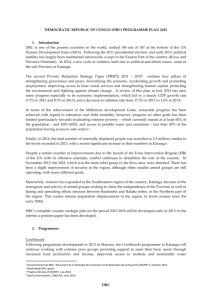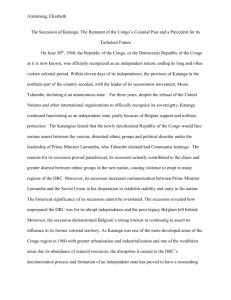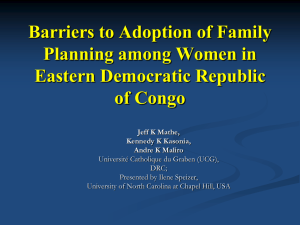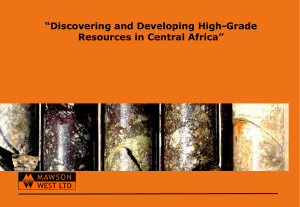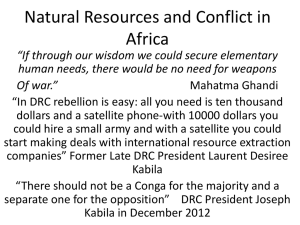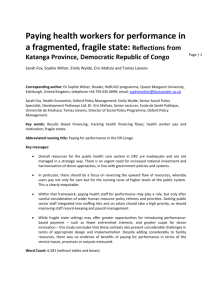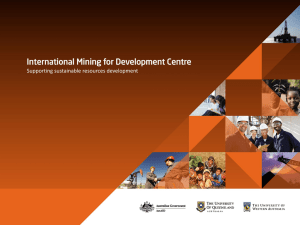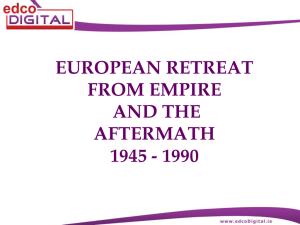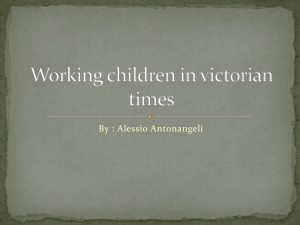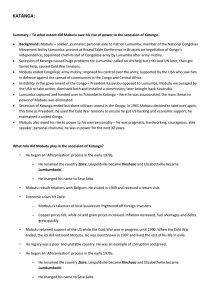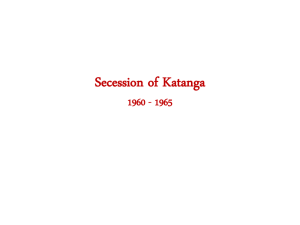The hell of mining in Katanga, DR Congo: Uranium-damaged
advertisement
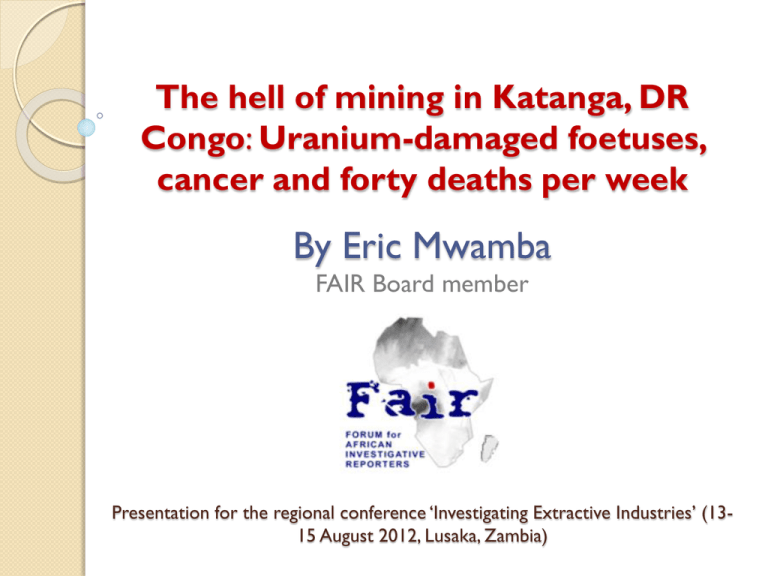
The hell of mining in Katanga, DR Congo: Uranium-damaged foetuses, cancer and forty deaths per week By Eric Mwamba FAIR Board member Presentation for the regional conference ‘Investigating Extractive Industries’ (1315 August 2012, Lusaka, Zambia) Source: www.katangamining.com Why investigating Katanga? - The copper belt running through Katanga and Zambia contains 34% cobalt and 10% of world copper - Gecamines, the Congolese company of State-owned copper and cobalt, holds concessions covering an area of 30,000 square kilometers in Katanga, around the towns of Kolwezi (West Group), Likasi (Core Group) and Lubumbashi (Eastern Group) World - China produces almost 30% of global cobalt, its 85% of this production is supposed from Congolese minerals, according to the estimations - According to estimates, the production of copper in the DRC, would be between 500,000 and one million tonnes over the past ten years, given the proliferation of companies that do not report their activities. So the hypothesis was that maybe in Katanga population has a good life making a difference with other provinces where the war and poverty are running. In Katanga province, many families have experienced cases of children born without a brain, abdominal wall, or with growth problems. Statistics from the provincial Ministry of Health indicate that, in Lubumbashi, “cases of children born with birth defects went from five per thousand in 2008 to 60 per thousand in 2011.” The numbers are too low, says Jean Claude Baka, chairman of the local human rights NGO ASADHO, because “many of these cases are not reported.” Some dramatic consequences noted: - 40 deaths of babies born with birth defects because of water pollution, air and soil by extractive industries located in residential neighbourhoods, this is enough consider that the population of Katanga is estimated at 8, 7 million inhabitants according provincial Ministry of the Interior - Expulsion of hundreds of workers craft their sites, massacre of claimants populations, destruction of homes (Cfr Malta Forrest, in 2009 in the village of Kawama, near Likasi), - Drying of water supply wells obtained with the support of NGOs following pumping companies in neighbourhoods - Many people died but not recorded by the lack of access to modern medicine very expensive, and lack of trust of the families of victims in government structures. - Many cases of death has consequences of accidents in quarries craft, bodies unburied, the families without news regard such deceased as missing - Artisanal work in the mines is dangerous, but it is the only alternative for graduates, families and fathers since Gecamines and SNCC have lost around 35,000 jobs by selling their assets and prerogatives to private companies. These, despite their growing numbers have not the capacity to absorb unemployment. In nearby Kisanga, a woman recently gave birth to a full-term baby with the size of a prematureborn, whilst three other babies born here recently were macrocephalic. Two died still in the hospital. Dr. Rukan, director of the Kisanga General Hospital, has noted ‘these new diseases’ in pregnant women who have been in contact with ‘the radioactive minerals that are transported in open trucks through our cities.’ Deaths from accidents Global Witness reported in 2007 that “current practices in the artisanal mining sector in Katanga are an undeniable violation of legal provisions,” even with regard to the DRC’s own basic public safety laws. In 2012, the situation has deteriorated further. Mineworkers and their families speak of an increasing death rate in the mines. There are no statistics or other documented reports concerning accidents and deaths. Miners often die in the mine itself, without families able to recover their bodies. Business with the friends Ten years ago big companies like Gecamines and the SNCC offered good employment (at least 50.000 jobs position) and decent services to both workers and the surrounding population, but the situation has deteriorated significantly under president Joseph Kabila. Businesses that don’t have ‘friends’ in the government find it difficult to survive. And those who have such ‘friends’ generally don’t pay much heed to workers’ or population rights. Most are exempt from paying tax. Uranium smuggling: ‘if you control the wrong people, you can be fired’ According to some of the studies found at Lubumbashi University, mines that are officially labelled as ‘cobalt’ and ‘copper’ mines may in fact contain uranium. “The DRC is a hub of uranium smuggling”, says Jean Claude Baka of ASADHO. “The military hierarchy is involved, both in the mining and in the trade.” Hakuna Matata Hakuna Matata has a fleet of more than 100 trailer trucks and an annual turnover of over several million dollars, and is among the biggest polluters in the region. Several customs officials and toll booth workers at the border post and on the road from Kasumbalesa to Kolwezi tell the same story: that Hakuna Matata trucks regularly escape radioactive controls as well as payment of toll fees set at $ 300 per truck. Across the border, Zambian president, Michael Sata, has expressed concern about the toxic hazards his citizens may be exposed to from the uranium trucks from the DRC, but he has not put measures in place to stop the traffic. Like the authorities, mining companies in DRC do not acknowledge responsibility for the environment, the fate of artisanal miners or the rights of local people. There are almost no laws to enforce good governance and respect for the rights of people in this sector. Most contracts exempt the companies from paying taxes, royalties and other rights to the state. The mining and investment codes do not contain binding provisions. The DRC also has not ratified Convention 176 of the UN which regulates safety in mining areas. There is a ministerial decree called "Kabwilulu" which requires companies to report what they pay. But the latest report from the ITIE in June 2012, said that "companies refuse" because they are so friendly to the President. A Minister does not represent anything. The EITI is a standard for transparency, but on a voluntary basis. The World Bank, IMF, EU, UK, and the international private sector encourage Kabila and his friends". They continue to support state budget at least about 50% or over None of the companies mentioned above responded to questions. Emails and phone calls were left unanswered. In Lubumbashi, a local official of Chemaf said, however, that ‘his company was paying taxes and that the responsibility for environmental protection was up to the government’. *Names of interviewed civilians, miners and medical patients changes at their request The article was refused by two media in DRC before it was published by Le Phare and L’Eveil in French,Foetus endommagés, cancer et de nombreux cas de décès : RDCongo, l’enfer des mines au Katanga. Read the full story on www.fairreporters.org
